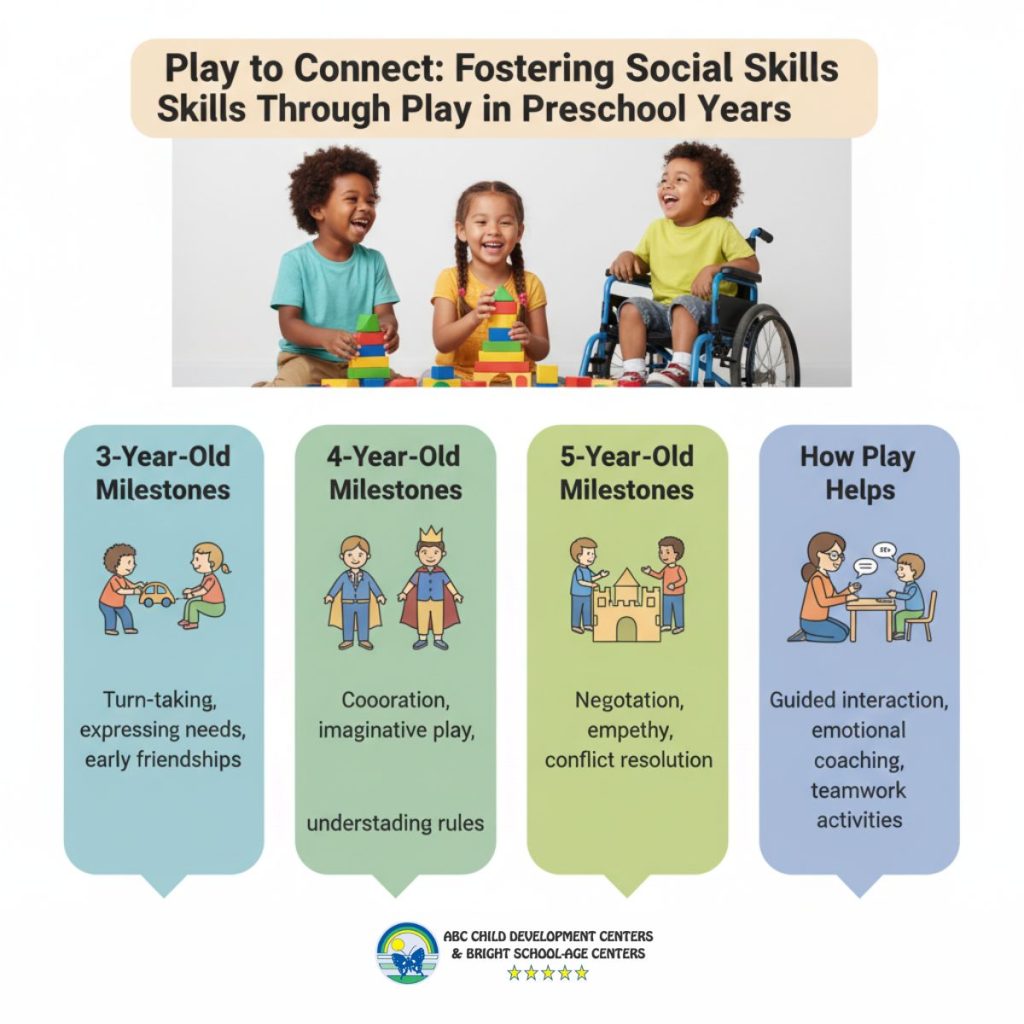Social-emotional health is the bedrock for success in school and life. In this post, we’ll break down the key social milestones your child is achieving between ages three and five and show you exactly how intentional, guided play in a quality preschool Greeley environment turns simple games into powerful life lessons.
Understanding Social Milestones (Ages 3-5)
The preschool years are a time of intense social and emotional growth. Children transition from mostly solitary or parallel play (playing beside others) to cooperative play (playing with others). These are the key skills we focus on:
At a Glance: Key Social Skills Developing Now
| Age Range | Emerging Social Skills |
| 3 Years | Starts taking turns, shows affection for friends without prompting, understands “mine” vs. “yours,” and expresses emotions verbally (though big emotions can still overwhelm). |
| 4 Years | Cooperates with peers, engages in imaginative/dramatic play, is often chatty, understands basic rules, and begins to empathize. |
| 5 Years | Wants to please friends, understands the difference between real and make-believe, and can negotiate and resolve conflicts with adult support. |

Common Concern: It’s normal for children in this age group to still have difficulty sharing or managing frustration. These moments are not failures; they are crucial learning opportunities for an experienced educator to step in and guide them.
The Power of Guided Play and Teacher Facilitation
In the high-quality educational programs for children that Greeley offers, play is not just “free time”, it is a carefully constructed tool. Our teachers don’t just watch; they participate, coach, and guide children through social challenges.
The Educator’s Role: Turning Conflict into Coaching
- Modeling: Teachers constantly model respectful language, listening, and problem-solving skills for children to observe and imitate.
- Scaffolding: When conflict arises (e.g., two children want the same toy), the teacher steps in to provide the language needed to negotiate: “I see you both want the red block. Let’s use our words. Sam, you could say, ‘May I have a turn when you are finished?'”
- Encouraging Empathy: We help children recognize the emotions of others. “Look at Lily’s face. She looks sad because her tower fell. What could we do to help her feel better?” This simple question shifts the focus from the child’s own desire to the feeling of their peer.
ABC East’s Approach to Empathy and Cooperation
At ABC East Child Development Center, we integrate social-emotional learning into every part of our day. Our teaching philosophy centers on creating a trusting community where every child feels safe enough to take social risks (like asking to join a game) and recover from social setbacks.
Building Blocks for Social Success in Our Classrooms
- Dramatic Play Centers: Our dedicated centers (e.g., kitchen, doctor’s office, construction zone) require children to assign roles, communicate their ideas, and compromise, which are the foundations of cooperation.
- The “Feelings Chart”: We utilize visual tools to help children identify and communicate their emotions before they escalate. This process of naming an emotion is the first step toward self-regulation.
- Cooperative Games: We plan activities that can only be completed when everyone works together, such as moving a large blanket or building a communal fort. These activities inherently teach teamwork and shared success.
Top Tip from Our Teachers: We often use puppets or story characters to act out social dilemmas. This gives children a safe, non-threatening distance to talk about tough topics like fairness, disappointment, and inclusion.
Practical Ideas for Fostering Social Skills at Home
Parents are a child’s first and most important teacher! You can easily reinforce the valuable social lessons learned in Preschool Programs right in your own home:
- Set Up Shared Projects: Instead of individual coloring books, try working on one giant puzzle or painting a mural on a large sheet of paper together. This necessitates collaboration.
- Model Empathy: Narrate your own feelings and reactions. “I feel frustrated right now because the washing machine isn’t working, so I’m going to take a deep breath.” This teaches healthy emotional regulation.
- Practice Turn-Taking: Use board games (like Candy Land or simple card games) to practice the structure of waiting and taking turns in a fun, low-stakes environment.
- Use “I Feel” Statements: When your child is upset, help them phrase their feelings directly: “I feel angry because I wanted to go first.” This teaches assertive communication instead of relying on yelling or hitting.
Common Concern: Is my child ready for the social environment of a preschool? Absolutely. Early exposure is key. We highly encourage parents to read our FAQs for answers about what to expect during the transition.
Give Your Child the Tools to Thrive Socially
Social skills are the fundamental toolkit children need to navigate school, the playground, and eventually, the workplace. By providing a structured, nurturing, and intentional environment, ABC East Child Development Center ensures that your child is not only academically prepared but also emotionally and socially robust.
Give your child the tools to thrive socially. Tour ABC East today! Contact us to see our joyful classrooms in action and learn more about our comprehensive approach to child development and school readiness.
